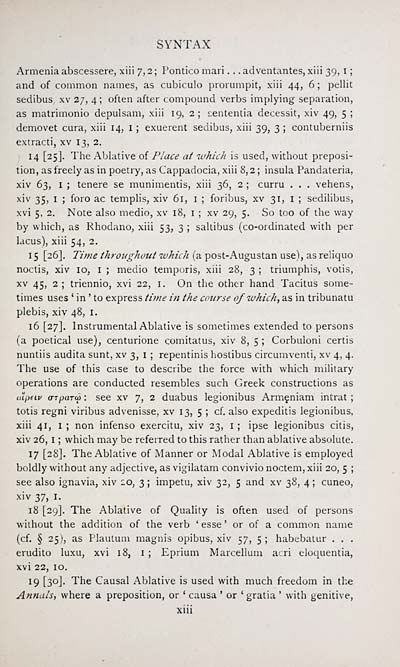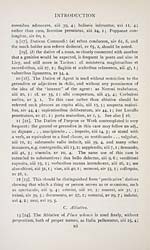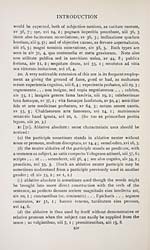Download files
Complete book:
Individual page:
Thumbnail gallery: Grid view | List view

SYNTAX
Armenia abscessere, xiii 7, 2 ; Pontico mari . . . adventantes, xiii 39, 1 ;
and of common names, as cubiculo prorumpit, xiii 44, 6 ; pellit
sedibus xv 27, 4 ; often after compound verbs implying separation,
as matrimonio depulsam, xiii 19, 2; sententia decessit, xiv 49, 5 ;
demovet cura, xiii 14, i ; exuerent sedibus, xiii 39, 3 ; contuberniis
extracti, xv 13, 2.
14 [25]. The Ablative of Place at which is used, without preposi-
tion, as freely as in poetry, as Cappadocia, xiii 8, 2 ; insula Pandateria,
xiv 63, I ; tenere se munimentis, xiii 36, 2 ; curru . . . vehens,
xiv 35, I ; foro ac templis, xiv 61, i ; foribus, xv 31, i ; sedilibus,
xvi 5, 2. Note also medio, xv 18, i ; xv 29, 5. So too of the way
by which, as Rhodano, xiii 53, 3 ; saltibus (co-ordinated with per
lacus), xiii 54, 2.
1 5 [26]. Time throughout which (a post- Augustan use), as reliquo
noctis, xiv 10, i ; medio temporis, xiii 28, 3 ; triumphis, votis,
XV 45, 2 ; triennio, xvi 22, i. On the other hand Tacitus some-
times uses ' in ' to express time in the course of which, as in tribunatu
plebis, xiv 48, i.
16 [27], Instrumental Ablative is sometimes extended to persons
(a poetical use), centurione comitatus, xiv 8, 5 ; Corbuloni certis
nuntiis audita sunt, xv 3, i ; repentinis hostibus circumventi, xv 4, 4.
The use of this case to describe the force with which military
operations are conducted resembles such Greek constructions as
(itpfii/ a-Tparca : see xv 7, 2 duabus legionibus Arm^niam intrat ;
totis regni viribus advenisse, xv 13, 5 ; cf. also expeditis legionibus,
xiii 41, I ; non infenso exercitu, xiv 23, i ; ipse legionibus citis,
xiv 26, 1 ; which may be referred to this rather than ablative absolute.
17 [28]. The Ablative of Manner or Modal Ablative is employed
boldly without any adjective, as vigilatam convivio noctem, xiii 20, 5 ;
see also ignavia, xiv 20, 3 ; impetu, xiv 32, 5 and xv 38, 4 ; cuneo,
xiv 37, I.
18 [29]. The Ablative of Quality is often used of persons
without the addition of the verb ' esse ' or of a common name
(cf, § 25), as Plautum magnis opibus, xiv 57, 5 ; habebatur . . .
erudito luxu, xvi 18, i ; Eprium Marcellum acri eloquentia,
xvi 22, 10.
19 [30J. The Causal Ablative is used with much freedom in the
Annuls, where a preposition, or ' causa ' or 'gratia ' with genitive,
xiii
Armenia abscessere, xiii 7, 2 ; Pontico mari . . . adventantes, xiii 39, 1 ;
and of common names, as cubiculo prorumpit, xiii 44, 6 ; pellit
sedibus xv 27, 4 ; often after compound verbs implying separation,
as matrimonio depulsam, xiii 19, 2; sententia decessit, xiv 49, 5 ;
demovet cura, xiii 14, i ; exuerent sedibus, xiii 39, 3 ; contuberniis
extracti, xv 13, 2.
14 [25]. The Ablative of Place at which is used, without preposi-
tion, as freely as in poetry, as Cappadocia, xiii 8, 2 ; insula Pandateria,
xiv 63, I ; tenere se munimentis, xiii 36, 2 ; curru . . . vehens,
xiv 35, I ; foro ac templis, xiv 61, i ; foribus, xv 31, i ; sedilibus,
xvi 5, 2. Note also medio, xv 18, i ; xv 29, 5. So too of the way
by which, as Rhodano, xiii 53, 3 ; saltibus (co-ordinated with per
lacus), xiii 54, 2.
1 5 [26]. Time throughout which (a post- Augustan use), as reliquo
noctis, xiv 10, i ; medio temporis, xiii 28, 3 ; triumphis, votis,
XV 45, 2 ; triennio, xvi 22, i. On the other hand Tacitus some-
times uses ' in ' to express time in the course of which, as in tribunatu
plebis, xiv 48, i.
16 [27], Instrumental Ablative is sometimes extended to persons
(a poetical use), centurione comitatus, xiv 8, 5 ; Corbuloni certis
nuntiis audita sunt, xv 3, i ; repentinis hostibus circumventi, xv 4, 4.
The use of this case to describe the force with which military
operations are conducted resembles such Greek constructions as
(itpfii/ a-Tparca : see xv 7, 2 duabus legionibus Arm^niam intrat ;
totis regni viribus advenisse, xv 13, 5 ; cf. also expeditis legionibus,
xiii 41, I ; non infenso exercitu, xiv 23, i ; ipse legionibus citis,
xiv 26, 1 ; which may be referred to this rather than ablative absolute.
17 [28]. The Ablative of Manner or Modal Ablative is employed
boldly without any adjective, as vigilatam convivio noctem, xiii 20, 5 ;
see also ignavia, xiv 20, 3 ; impetu, xiv 32, 5 and xv 38, 4 ; cuneo,
xiv 37, I.
18 [29]. The Ablative of Quality is often used of persons
without the addition of the verb ' esse ' or of a common name
(cf, § 25), as Plautum magnis opibus, xiv 57, 5 ; habebatur . . .
erudito luxu, xvi 18, i ; Eprium Marcellum acri eloquentia,
xvi 22, 10.
19 [30J. The Causal Ablative is used with much freedom in the
Annuls, where a preposition, or ' causa ' or 'gratia ' with genitive,
xiii
Set display mode to: Large image | Transcription
Images and transcriptions on this page, including medium image downloads, may be used under the Creative Commons Attribution 4.0 International Licence unless otherwise stated. ![]()
| Early Gaelic Book Collections > Matheson Collection > Cornelli Taciti annalium > (17) |
|---|
| Permanent URL | https://digital.nls.uk/76567142 |
|---|
| Description | Items from a collection of 170 volumes relating to Gaelic matters. Mainly philological works in the Celtic and some non-Celtic languages. Some books extensively annotated by Angus Matheson, the first Professor of Celtic at Glasgow University. |
|---|
| Description | Selected items from five 'Special and Named Printed Collections'. Includes books in Gaelic and other Celtic languages, works about the Gaels, their languages, literature, culture and history. |
|---|

